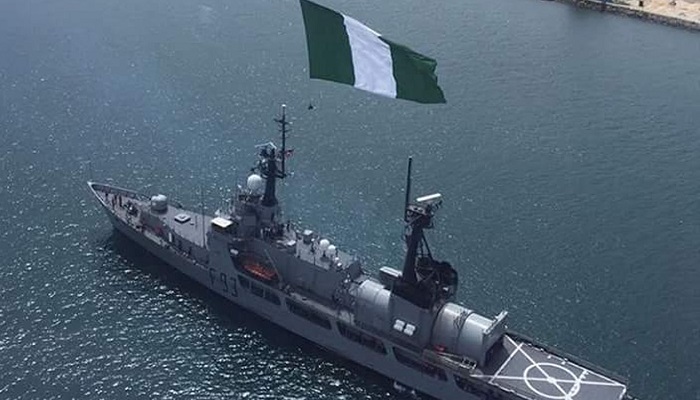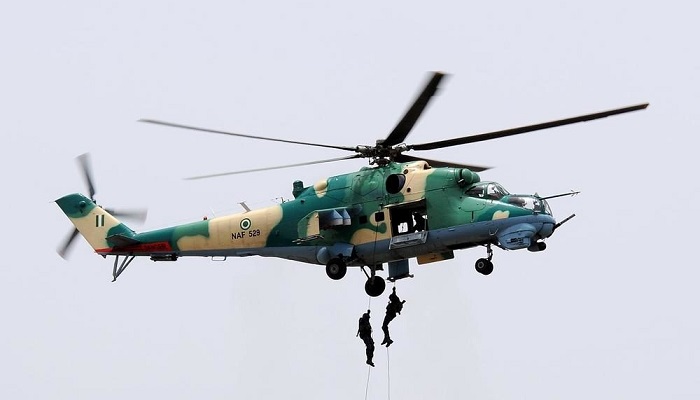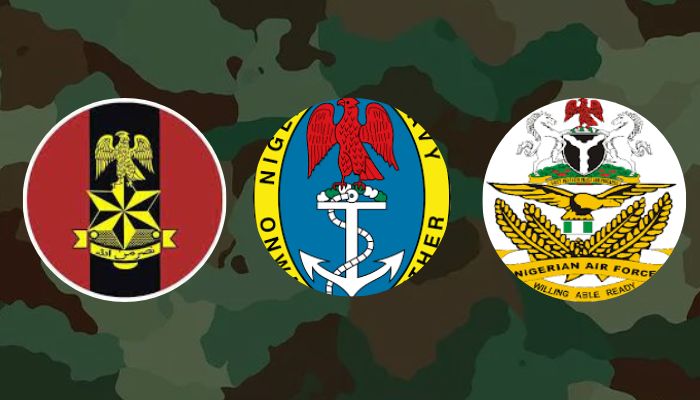The Armed Forces In Nigeria is a collective name for the military forces of the country whose primary duty is to protect the country from both internal and external aggression.
While many people may mistakenly believe that the country’s armed forces are made up only of the army, they are actually the combined military forces of Nigeria. It consists of three service branches: the Nigerian Army, the Air Force, and the Navy, each of which has a specialized purpose.
As of 2020, the World Bank reported that the country’s armed forces personnel numbered over 223,000.
Complete List Of Armed Forces In Nigeria
The Nigerian Army (NA)

- Founded: 1956
- Head: Chief of Army Staff
Like most armies in the world, the Nigerian Army is the branch of the armed forces responsible for ground combat. It is saddled with the responsibility of safeguarding the country’s land and repelling any form of land aggression. When paramilitary forces are unable to handle unrest in the country, the Nigerian Army is called in to provide support.
Its history dates back to 1864, when Lieutenant Glover organized some locals from the northern part of the country into a formation known as the “Glover Hausa.” Over time, the unit changed its name to the “Hausa Constabulary” and later to the “Lagos Constabulary.” The modern Nigerian Army began to take shape when it became the Royal Nigerian Army in 1956. Two years later, in 1958, the British government gave control of the unit to the Nigerian government.
Although its history predates Nigeria’s independence, the Nigerian Army was officially formed in 1960 for the purpose of land warfare. It became known as the Nigerian Army in 1963, when the country became a republic. The highest-ranking officer of the Nigerian Army is the Chief of Army Staff. Officers such as Lieutenant General Theophilus Danjuma, Lieutenant General Abdulrahman Dambazau, and Lieutenant General Farouk Yahaya have all led the army in the past. As of this writing, Major General Taoreed Lagbaja is the Chief of Army Staff.
The Nigerian Army has various formations across the country, including the Mechanized Division in Kaduna and Ibadan, the Armoured Division in Jos, the 6 Amphibious Division in Port Harcourt, the Infantry Division in Maiduguri, the Task Force Division in Sokoto, the Composite Division in Enugu, the 81 Amphibious Division in Lagos, and the Guards Brigade in Abuja.
The army has been involved in various operations both domestically and internationally. Within the country, its engagements have included the Nigerian Civil War, the Niger Delta Crisis, and the Boko Haram Insurgency. Internationally, the army has been involved in the Congo Crisis, the Liberian Civil War, the Sierra Leone Civil War, the Mali War, and the Invasion of the Gambia. Some of these international operations were conducted under the auspices of ECOMOG.
Once considered to be one of the best armies in Africa, the Nigerian Army’s reputation has been tarnished by the Boko Haram insurgency and other security challenges facing the country.
See Also: Most Technologically Advanced Military in Africa
Nigerian Navy(NN)

- Formed: By act of Parliament in 1956
- Headed By: Chief of Naval Staff
This branch of the Nigerian Armed Forces is responsible for defending and maintaining the territorial waters of Nigeria from any form of threat. To achieve this, the Navy has three pillars: integrity, professionalism, and teamwork, by which its personnel live.
In fulfilling its responsibility to defend the country, the Navy has realized the importance of teamwork and upholds the motto “Onward Together” to show that an armed force is an undefeated unit if there is unity.
To make its work easier, the Navy has a force of more than 25,000 personnel, with the most senior ranking officer being the Chief of Naval Staff. As of this writing, the most senior officer is Vice Admiral Emmanuel Ogalla, who was appointed by President Bola Tinubu in June 2023. Ogalla took over from Vice Admiral Awwal Zubairu Gambo.
The Navy also has materials such as frigates, offshore patrol vessels, fast attack aircraft, patrol buoy tenders, and amphibious warfare ships, which have helped to make it one of the strongest navies on the continent. Other countries with strong navies include Egypt, Morocco, South Africa, and Algeria
Like the army, the Nigerian Navy (NN) has a history dating back to the precolonial era, specifically the 1880s. Over the years, it has undergone various reorganizations. Notably, it began operations on June 1, 1956, as the Naval Defence Force. It became the Nigerian Navy in 1963 after the country became a republic.
The NN has 9 branches and 6 commands. The commands are controlled from 3 operational commands located in Apapa, Lagos (western command), Yenagoa (central naval command), and Eastern naval command.
As one of the three branches of the Nigerian armed forces, the navy has been involved in both national and international operations. Notably, it has participated in the following:
National
- The Nigerian Civil War
- Niger Delta Conflict
- Boko Haram Insurgency
International
- First Liberian Civil War
- Sierra Leone Civil War
- Invasion of the Gambia
Nigerian Air Force(NAF)

- Formed: By statutory act of Parliament in April 1964
- Headed By: Chief of Air Staff
The Nigerian Air Force (NAF) is the youngest branch of the Nigerian Armed Forces. It consists of 18,000 service members and is headed by the Chief of the Air Staff. The NAF is responsible for protecting Nigeria from any threats in the air and gaining control of the air in the event of war. It also provides strategic and tactical support to the army and navy.
Like its counterpart, the Nigerian Navy, the NAF began to take shape in 1958, when lawmakers proposed its establishment. At the time, Nigeria relied on other countries for air defense, but in 1962, the government began training personnel in countries such as West Germany, Ethiopia, Canada, and India. In 1964, a statutory act was passed to establish the NAF.
The NAF is currently headed by Air Marshal Hassan Abubakar, who assumed office in June 2023. The first officer to hold this position was Colonel Gerhard Kahtz. Other notable Chiefs of the Air Staff include Colonel Shittu Alao, Air Marshal Isiaka Oladayo Amao, and Air Marshal Sadique Abubakar.
The NAF functions through 6 principal staff branches, 4 direct reporting units, and 4 operational commands, which are located in Makurdi, Yenagoa, Lagos, Ilorin, Calabar, Warri, and Abuja.
So far, the NAF has been involved in both national and international crises. While some of its engagements have been quite successful, the force has also suffered some accidents. Between 1992 and August 2023, there have been 7 reported crashes and incidents. The most recent crash, which occurred at Chukubu village in Shiroro, Niger State, was claimed by the Islamic Jihadists.















